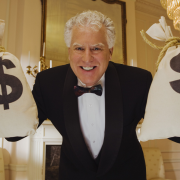The accidental billionaire activists
The news on Wednesday that Russian billionaire Vladimir Yevtushenkov had been accused of money laundering and placed under house arrest sent shudders through Russia's wealthy class.
Yevtushenkov, the Sistema conglomerate's largest shareholder, is not a public critic of Vladimir Putin, unlike oil magnate Mikhail Khodorkovsky, who was jailed for a decade for fraud and tax evasion before his release late last year. Yet he too seems to have run afoul of the Russian President.
Putin relies on the support of Russian elites to retain his hold on power. If this one appears to have been unjustly arrested and launches a robust defense, and his travails shake the elites' confidence in the Russian leader, Yevtushenkov will have joined a rarefied group that also includes Khodorkovsky: the accidental billionaire activist.
Billionaires are not usually at the forefront of the fight for democracy. One tends to assume that they are too busy getting ever richer, or spending their abundant wealth on trophy real estate, yachts and private jets. Many of them engage in charitable activities, but it is often for causes in which they have a direct or narcissistic stake, such as the arts, medical research or education.
More rarely is it about defending liberty or human rights. But by pursuing their own business interests, the ultrarich can occasionally promote the rule of law, and thus serve the greater good. This unintentional activism is akin to Adam Smith's idea of the market's "invisible hand," only with political rather than economic implications.
Although it is unclear whether he will benefit financially from the recent rulings, Khodorkovsky and his former partners have succeeded in putting Putin's Russia in an embarrassing position, just when the country is more isolated than ever following its imperialistic moves on Ukraine.
In Argentina, the autocratic President Cristina Fernandez de Kirchner has been bedeviled by American hedge-fund manager Paul Singer in a way that Argentines can only dream of.
The Singer-Kirchner quarrel dates to 2005, four years after Argentina defaulted on its massive sovereign debt. Bondholders were then offered the opportunity to exchange their defaulted securities for new ones, worth about one-fourth of the debt's original value. It was better than losing everything, and many bondholders took the deal. Singer's firm, Elliott Management, turned it down. Thus began a long legal battle, the recent outcome of which proved to be a major blow for Argentina.
A US Supreme Court ruling on June 16 prevented Argentina from paying those who exchanged their defaulted bonds for less-valuable ones if it didn't pay Elliott and other creditors (known as holdouts) who didn't accept the offer, thus triggering Argentina's second default in 13 years. Kirchner's administration -- which, in 2012, expropriated a 51 per cent stake in YPF, the largest local energy company, from Spanish conglomerate Repsol -- must deal with the consequences of its economic mismanagement.
Under the 12-year leadership of former prime minister and now President Recep Tayyip Erdogan, Turkey has been sliding from a moderate Muslim Middle Eastern democracy to a more authoritarian regime with little respect for civil liberties. Aydin Dogan, a Turkish billionaire and media mogul, has stood up to the government. In 2009, after being hit by a controversial $500m tax charge and fine, Dogan accused then-Prime Minister Erdogan of wanting to muzzle critics and create a "calm and silent" Turkey.
Earlier this year, several wiretapped phone conversations of Erdogan were released, starting a major political scandal. In one of those recordings, the prime minister could be heard directing his minister of justice to seek a severe ruling against Dogan in his tax-evasion case. The leaked recording didn't prevent Erdogan's landslide victory in the country's presidential election on Aug. 10, but it exposed the true nature of his grip on Turkey.
In Egypt, Although Mohammed Morsi was democratically elected president in June 2012, following the chaotic end of Hosni Mubarak's 30-year rule, the Muslim Brotherhood leader embarked on an increasingly autocratic rule that made him widely unpopular. After months of protests, he was eventually removed from power through a quasi-military coup, one year after being sworn in. Egyptian billionaire tycoon Naguib Sawiris had a lot to do with Morsi's fall.
An opponent to the president and his Islamist organisation, Sawiris used his telecom and media empire (including a television network he founded, and the country's largest private newspaper), as well as his political party, Free Egyptians, to support the uprising against Morsi. Mr. Sawiris's desire for a more law-abiding and investor-friendly government fueled his hostility toward the Morsi administration. So did tax investigations against his family companies, which he said were politically motivated.
There is no telling what the consequences of Messrs. Khodorkovsky, Singer and Dogan's battles will be in those countries where democratically elected leaders tend to transform into would-be dictators. A diminished Argentina, whose currency is now under attack, may end up getting rid of the Kirchner dynasty and its Peronist clique. An already ostracized Russia now runs the risk of seeing some of its foreign assets seized by former Yukos shareholders, further weakening its economy and position on the global stage. President Erdogan can no longer be painted as an exemplary democrat. Adam Smith's invisible hand may be at work, even when it is covered with gold.
Romain Hatchuel is managing partner of Square Advisors LLC, a New York-based asset-management firm.
This article was first published in the Wall Street Journal. Reproduced with permission.
















